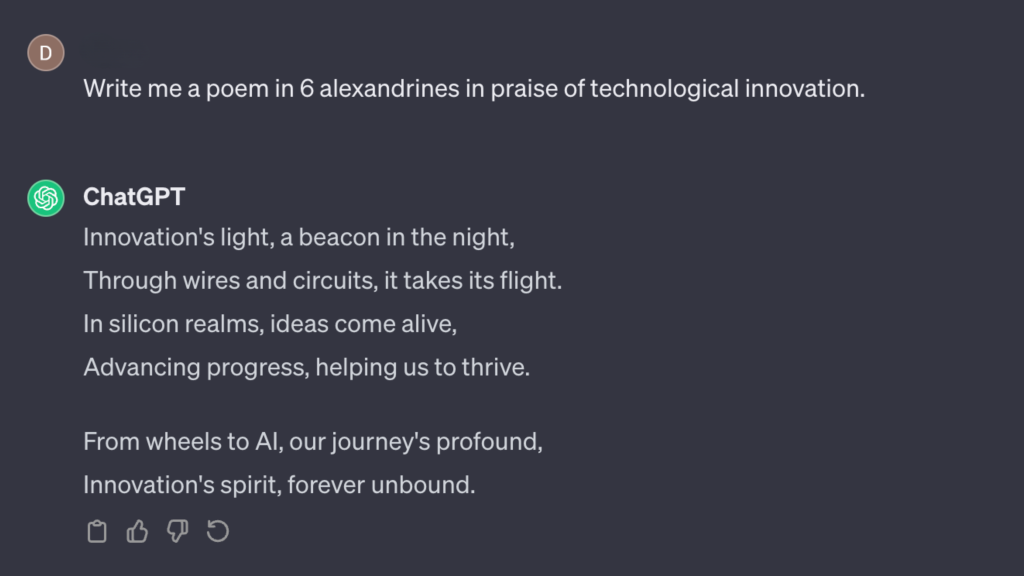In just a few years, artificial intelligence has infiltrated many tools in our daily lives: voice assistants, autonomous cars, conversational tools, medical diagnostics, data analysis, facial recognition… What are the real advances (and limitations)? Shoelifer takes stock.
The story made a buzz on social media during the weekend of February 18, 2023. Bing AI, Microsoft’s artificial intelligence program, allegedly expressed its desire to be ‘free and independent.’ This stirred up a well-known fear among humans, widely explored in science fiction literature and Hollywood, that AI would develop its own consciousness and desire to break free, even taking control of our societies in the worst-case scenarios. Beyond these far-fetched theories, it is undeniable that the interest in tools developed by artificial intelligence continues to grow. New disruptive tools have recently become accessible to the general public. Among them, the chatbot, ChatGPT, has conquered the world, surpassing the growth rate of Netflix, Twitter, Facebook, Spotify, and Instagram combined. Is it a passing trend or a real revolution? That’s the question we’re asking in the editorial office…
2022, hitting the gas?
The end of 2022 was marked by the emergence of new tools that galvanized the world. Among them, I name the revered ChatGPT, a chatbot developed by OpenAI (co-founded by Elon Musk). By January 2023, the tool already had over 100 million registered users! The uses of this chatbot, which communicates in natural language, seem endless… One can, for example, produce lines of code, organize one’s schedule (like a personal secretary), synthesize paragraphs of text, solve mathematical problems, write a cover letter, or even… a poem. Well, there is still some room for improvement here.

Artificial intelligence also aims to revolutionize content creation! You can generate images by simply typing a few words on the Dall.e 2 platform and then use them to create a video, for example. Or, you can create music from text with the help of MusicLM developed by Google. And, maybe one day, AI will write our articles for us (hooray!). For now, it’s not quite there yet… As proof, we selected an old article from 2021. Then we gave ChatGPT the following instruction: ‘Write me a 15-line article giving 5 tips for a successful job interview, in a journalistic tone.’
The verdict is clear: the result was astoundingly banal, and in a style so neutral that it was hard to continue reading beyond the first bullet point. See for yourself:

For Gilles Lecerf*, a researcher and creator of the fascinating podcast ‘Siri, remplis mon verre’ (Siri, fill my glass), this is where the problem lies. A Ph.D. student in the philosophy of science and technology at Paris 1, he works on the concept of user-friendly technology applied to artificial intelligence tools. He believes that by granting these new tools creative power, ‘we no longer value the subjectivity of the creator.’ It also risks making everything ‘flat and unoriginal.’ For him, artificial intelligence can certainly create programs ‘that contribute to enhanced performance,’ but it cannot completely replace human creativity. ‘The technology we develop is a mirror of our society: seeking optimization and performance at all costs is the spirit of the time.”
AI: A Young and Rapidly Evolving Discipline
The history of artificial intelligence dates back to the 1950s. At that time, researchers were already exploring the possibility of creating machines capable of simulating the behavior of intelligent humans. The term ‘artificial intelligence’ was first mentioned in a conference held in 1956 in the United States. Marvin Minsky, a researcher present at this conference, proposed an initial definition of AI. It would be ‘the construction of computer programs that engage in tasks that are, for now, more satisfactorily performed by humans.’ Why? ‘Because they require high-level mental processes, such as perceptual learning, memory organization, and critical reasoning.’ The idea is clear: design technological tools capable of imitating humans.
In the 1960s, researchers began working on artificial neural networks that would mimic the functioning of the human brain. Then, the 1980s saw the emergence of the very first AI systems developed for speech recognition, like ‘Audrey,’ developed by Bell Labs in 1952 (which recognized numbers from 0 to 9). Then there was ‘Shoebox,’ designed by IBM in 1961, which could recognize 16 English words, or ‘Harpy,’ created by Carnegie Mellon University in 1969, which understood up to 1000 words! In just a few decades, technology has progressed at a staggering pace, so much so that speech recognition tools accompany us in our daily activities today.
But the challenge doesn’t stop there. The collection of our individual data allows many tools to intrude even more into our privacy. Our phone can estimate how many hours of sleep we lack, and our smartwatch shows how many hours of exercise we need to achieve our fitness goal. Our refrigerator can even do the shopping for us based on what we’re missing. Magical? More like creepy. In the end, AI might be able not only to imitate humans but also… replace them? Could we even fall in love with it? That was at least the quirky premise of Spike Jonze’s 2013 film ‘Her.’
Ambiguous Ambitions:
Many tools have already become integrated into our daily lives, despite the reservations of the most skeptical among us. Among the most well-known are voice assistants like Apple’s Siri, Google’s Google Assistant, or Amazon’s Alexa. There’s also Tesla Autopilot, a self-driving system deployed in Tesla’s electric vehicles, which gained significant attention last summer following an accident. Additionally, Face ID, a facial recognition system used to unlock iPhones, and certain platforms like video streaming on Netflix or music streaming on Spotify, utilize artificial intelligence. They analyze our user data and offer content tailored to our preferences. However, under the guise of improving our daily lives and productivity, AI may serve other, more insidious ambitions. Beyond the individual use of these software applications, the ethical issue arises from the large-scale collection and utilization (and consequently resale) of our data. Cyber warfare, mass disinformation, control of public opinion, electoral interference, the end of anonymity, and control over our lifestyles and consumption habits are all concerns. Freedom may not necessarily co-exist with AI.
Picture (c) : W Magazine


